A BLM Founder Looks Back and Ahead
While racial equity progress is slow, Melina Abdullah sees enough hope to continue.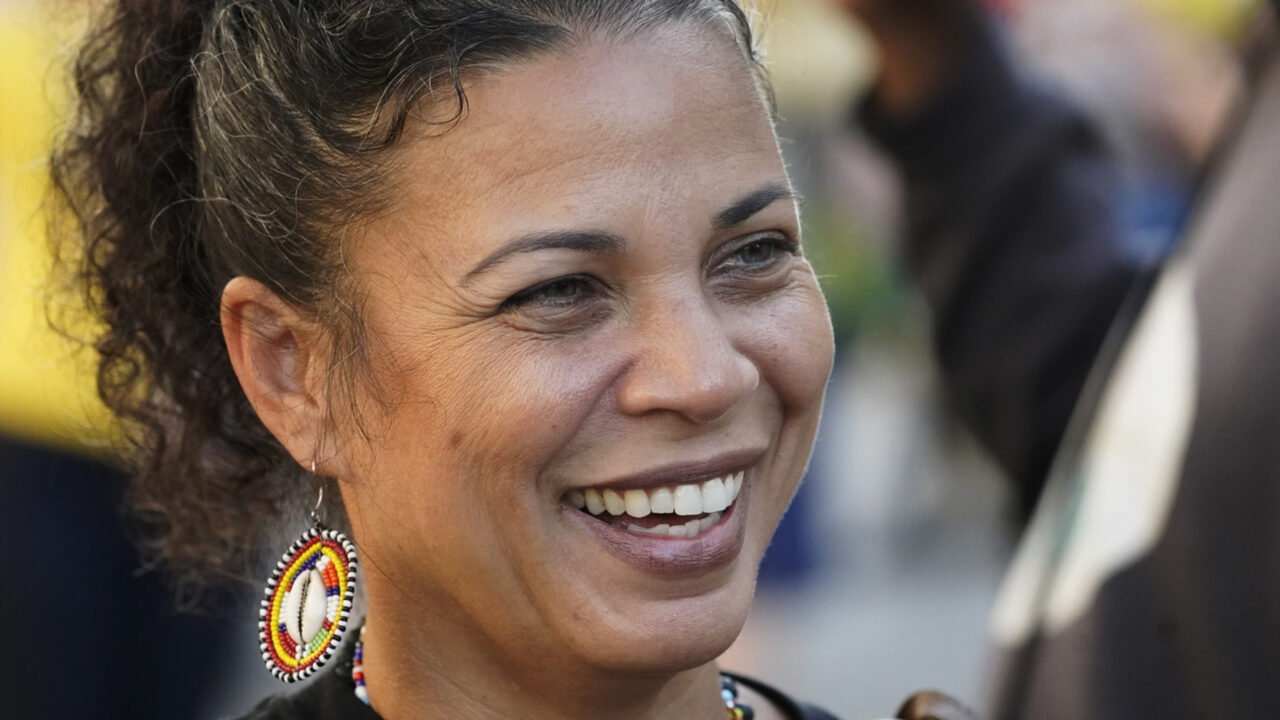 Melina Abdullah, co-founder of Black Lives Matter-Los Angeles, smiles as supporters gather outside the gated Hall of Justice to protest in downtown Los Angeles, Nov. 4, 2020. (AP Photo/Damian Dovarganes)
Melina Abdullah, co-founder of Black Lives Matter-Los Angeles, smiles as supporters gather outside the gated Hall of Justice to protest in downtown Los Angeles, Nov. 4, 2020. (AP Photo/Damian Dovarganes)
Melina Abdullah is professor of Pan-African studies at Cal State Los Angeles and a co-founder of Black Lives Matter L.A. She is also co-director of Black Lives Matter Grassroots. Originally from Oakland, she has spent the last 10 years on the front lines of BLM as an organizer, leader and spokesperson for its many campaigns and political causes, both local and national. In her spare time, she hosts two radio shows, “Move the Crowd” (90.7 KPFK FM) and “This is Not A Drill” (1580 KBLA AM). She lives in Mid-City with her three children. I recently spoke with Adbullah about her time in BLM and what the movement has wrought.
Truthdig: So how did this all begin?
Melina Abdullah: BLM was born, we were born July 13, 2013, the day George Zimmerman was acquitted. You know how Black people do — we go to Leimert Park! For three days we organized intuitively, me with my children and my students that I call my children. On the third day we were called together by Patrisse, who was living then in St. Elmo Village (in Mid City). That night, the 15th, we pledged to build a movement, not a moment. It was about half of Patrisse’s artist friends, the other half were my students.
When we made this commitment; it wasn’t clear it would completely change our lives. I didn’t know that it would completely end home cooking, or threaten the safety of my home. I’ve been swatted three times by police, I’ve had cameras trained on my door. We thought we’d be making protest signs on the weekend.
Truthdig: How else has it changed the course of your life?
MA: BLM impacted my trajectory as an intellectual. I’d been seen for years as somebody who was kind of on a course to move into more traditional academic or political leadership. It struck me that I was going somewhere different, during a protest in 2015 in front of the mayor’s house. I remember being very conscious of sacrificing my insider access. The upper administration at Cal State L.A. has seen me as an adversary, not an asset. I love the students, love who we serve; it’s a very working-class, majority people of color institution. One thing I never understood is why it never capitalized on its own history, and BLM is part of its history. It should be bragging! Half the members come from here, but what I’ve experienced is a kind of the quieting of it. Instead of being proud of who we are, they try to hide it. What that’s meant for me is that CSLA is being complicit with police. The university called the cops when I was trying to attend a mayoral debate on campus. The school never apologized, kind of doubled down on it. A couple of weeks ago, I caught police in my faculty office allegedly investigating suspicious email, another time they said they were accompanying a phone tech …we see this constantly. I’m reminded of what lots of ancestors say, you can’t expect the institutions tied up in racism to reward you. Nah.
When we made this commitment; it wasn’t clear it would completely change our lives.
Part of my agitation is organizing for ethnic studies. One of the greatest victories was winning a college of Ethnic Studies for CSLA — I was real pivotal in that. Many people said I should be the inaugural dean, there was a big campaign by political leaders to support that. The provost in 2020 issued a statement that said, ‘Melina is not being named dean and will never be named dean.’ That’s not OK with me. It felt terrible. I’ve been here since 2002. But you have to play by the rules to have a space and place in university.
Truthdig: Do you ever think about stepping down from BLM?
MA: I think about that regularly! If I had stayed a cool-ass professor… you think about that and you get into a little bit of self-pity. And then you’re restored. I felt that last week. I was in Jackson, Mississippi, and we walked through a tour, into an auditorium where Ella Baker had given a speech about how those of us who struggle cannot rest. And then you think, what the hell? Then I get into a space of deep gratitude. So many people, their main anchor is something like a TV show, and we have a life’s purpose. I’m so tremendously grateful that I get to live a purposeful life and that I’m surrounded by purposeful people. Everything is not perfect or clean or neat but I feel like I’m heeding my sacred duty. All of my three kids are involved and they have a purpose too. I don’t know any mothers who have a tighter bond with their children.
Truthdig: How would you describe what BLM is, and what it does?
MA: It’s a spiritual movement, and holistic. When we say our mission is to end state-sanctioned violence against Black people, we’re saying: Don’t murder us. It also means that violence is Black people living on skid row, it’s the fact that Ruchell Magee is still in prison after more than 50 years; violence is my sixth-grader getting cops called on her eight times in a semester. BLM has to stand up for all of this, we’ve got to transform overall systems of harm. This morning I got to be with Helen Jones, whose son John was killed in 2009 in county jail. She said, until BLM came along she was flying her plane alone, and Black Lives Matter gave her somewhere to land her plane. It’s beautiful that we get to do that.
The positive is all these kids!! In 2020 when we experienced a very early renaissance of BLM, in the massive uprisings which were not about George Floyd — it was a movement that was there to meet that moment. One of our clarion calls, defund the police, started gaining traction.
We got the police budget cut by 4%, $150 million. As we were doing that, the kids were pushing to defund school police, and that was cut by 35%! We were doing a protest on the steps of city hall and they were marching back from theirs. I was so proud. I was crying. They not only cut that budget, they removed cops from school campuses. There will be no more instances of sixth-grade Black girls being harassed eight times in a semester. We’re going, ‘You did it!’ My daughter Amara takes the mic from me and says, ‘We’re not done fighting. We’re not stopping until we get all of it.’ That is the victory. It’s the cuts, the policies, but it’s also the unapologetic, audacious vision that’s been instilled in our young people. That’s the victory of the last 10 years.
Truthdig: BLM was criticized early on for not having central leadership. Has that more or less worked out?
MA: We tried to honor what Ella Baker encouraged: group-based leadership. So we’re not leaderless, we’re leader-ful. We are the folks we’ve been waiting for. So it had to be young people. Prince Akili, one of the leaders of a prison chapter, was arrested as a 15-year-old child in LA and went to prison for enhancements. They said he was part of a gang even though there was no murder, no violent crime, only a gang association with a guy who did have a gun. He hadn’t done anything. He just came home at 32. Prince Akili helped us win policies that would help prevent the same thing happening to other kids like him, kids basically snatched from their mothers.
Truthdig: Talk about BLM’s involvement in electoral politics.
MA: We have a mantra: vote and organize. Every season we summon the spirit of Fannie Lou Hamer. We organize people to vote, and we voted out (former Los Angeles county District Attorney) Jackie Lacey. And on Wednesday you still gotta organize. You got to build our own power, utilize every mechanism in the system, including voting. Young Black activists are getting elected — there’s Cori Bush, Maxwell Frost in Florida, the first Gen Z congressperson.
When we say our mission is to end state-sanctioned violence against Black people, we’re saying: Don’t murder us.
But no people ever votes its way to freedom. In addition to paying attention to who’s in office, we help pass laws like county initiatives Measure J and Measure A, which allows us to remove sheriffs. Those things are really important, all the down-ballot stuff is really important.
The only way we lose is to stop. When our ancestors were stolen from Africa, they never submitted to chattel slavery and it took 250 years of struggle to end the system. We would have lost if we didn’t struggle. What did Mama Harriet (Tubman) feel with all the personal issues, about the fact her husband wouldn’t come North with her? How lonely was she feeling? But if she hadn’t struggled with her whole self, what would have happened? Until we’ve transformed this world we’re not stopping. All our kids deserve it, and we (adults) do too.
Truthdig: Polls show that a majority of the public still supports Black Lives Matter, but that support has diminished considerably since the George Floyd moment of 2020. Do you think the decline is temporary?
MA: There is a backlash, a push and pull in every movement. The question is, are you gonna give up when it’s unpopular? We protest at the Police Protective League every Wednesday. Yesterday there were 50 people. There is an older white man who uses a cane who comes almost every week. He said to me, ‘What are you most proud of, having been there when there were hundreds of thousands in the street, or now, when it’s not popular?’ The answer is very clear — I’m most proud of being there when it’s not popular. When people aren’t painting giant letters in the street. Martin Luther King once said, ‘Cowardice asks, is it safe?’ You do it because it’s right. I’m not retiring from this.
Things make me proud every day. For the first time in Louisiana’s history, five officers are being prosecuted for murder of Ronald Greene. That there are now 53 police officers in California who’ve been decertified. Normally badly behaving cops go from one force to another, shift from city to city, but we were able to pass a piece of legislation, the Kenneth Ross Jr. Decertification Act (Ross was killed by police in Gardena). And eight of the 53 are from Torrance. It’s a very clear victory. Criminal prosecution of cops is almost impossible, but these are different mechanisms of accountability. Prior to the act passing in January, there was no decertification process at all. California, contrary to its reputation, is the most problematic state in terms of police brutality, repression, all that. Once again we lead the way.
Your support matters…Independent journalism is under threat and overshadowed by heavily funded mainstream media.
You can help level the playing field. Become a member.
Your tax-deductible contribution keeps us digging beneath the headlines to give you thought-provoking, investigative reporting and analysis that unearths what's really happening- without compromise.
Give today to support our courageous, independent journalists.
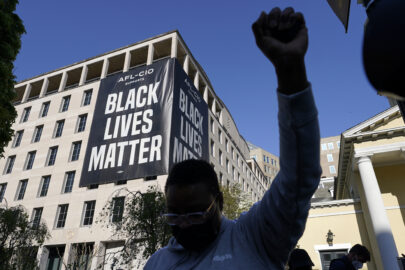
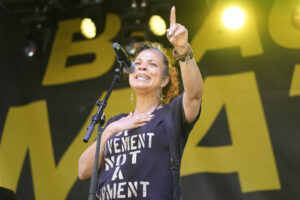
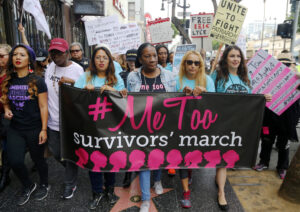
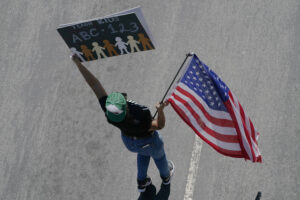
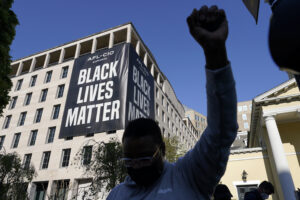
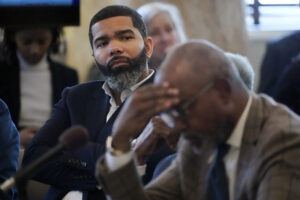
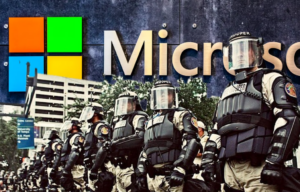
You need to be a supporter to comment.
There are currently no responses to this article.
Be the first to respond.